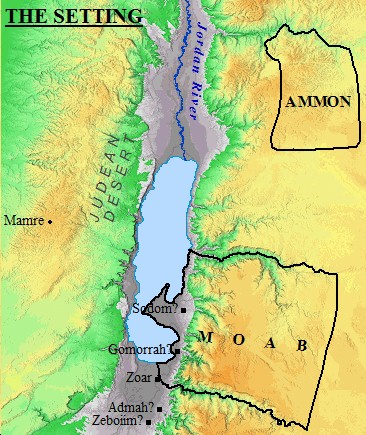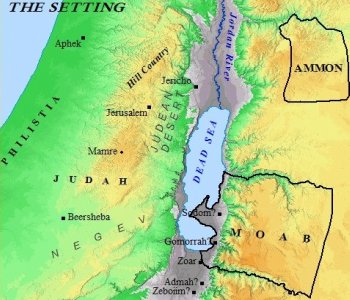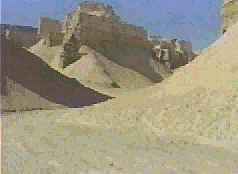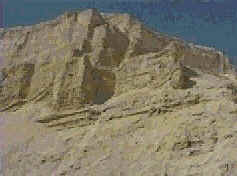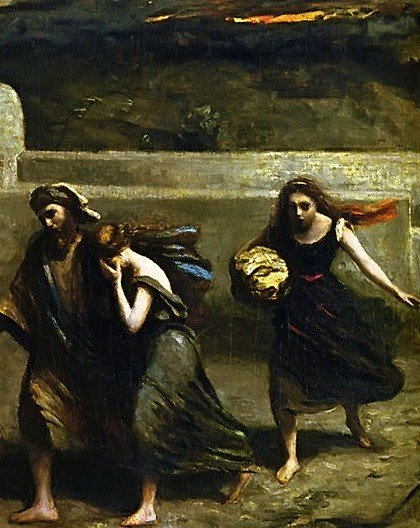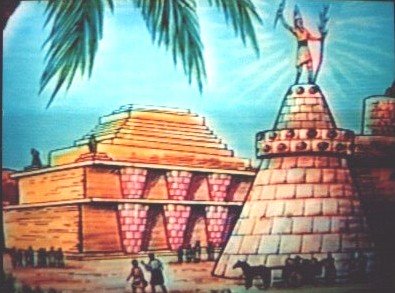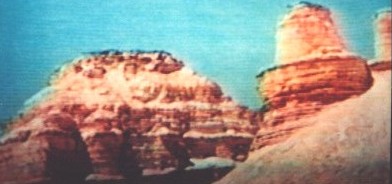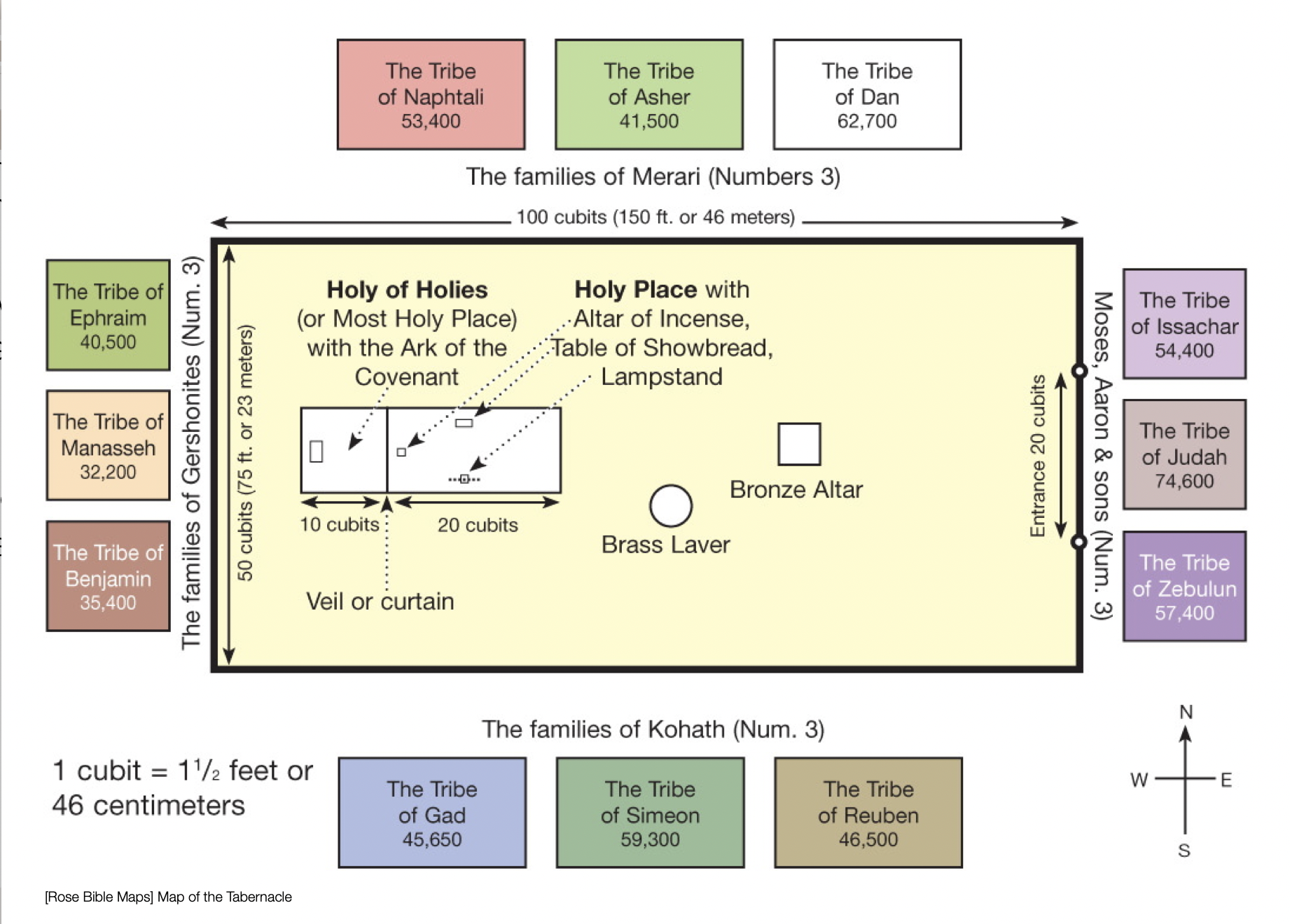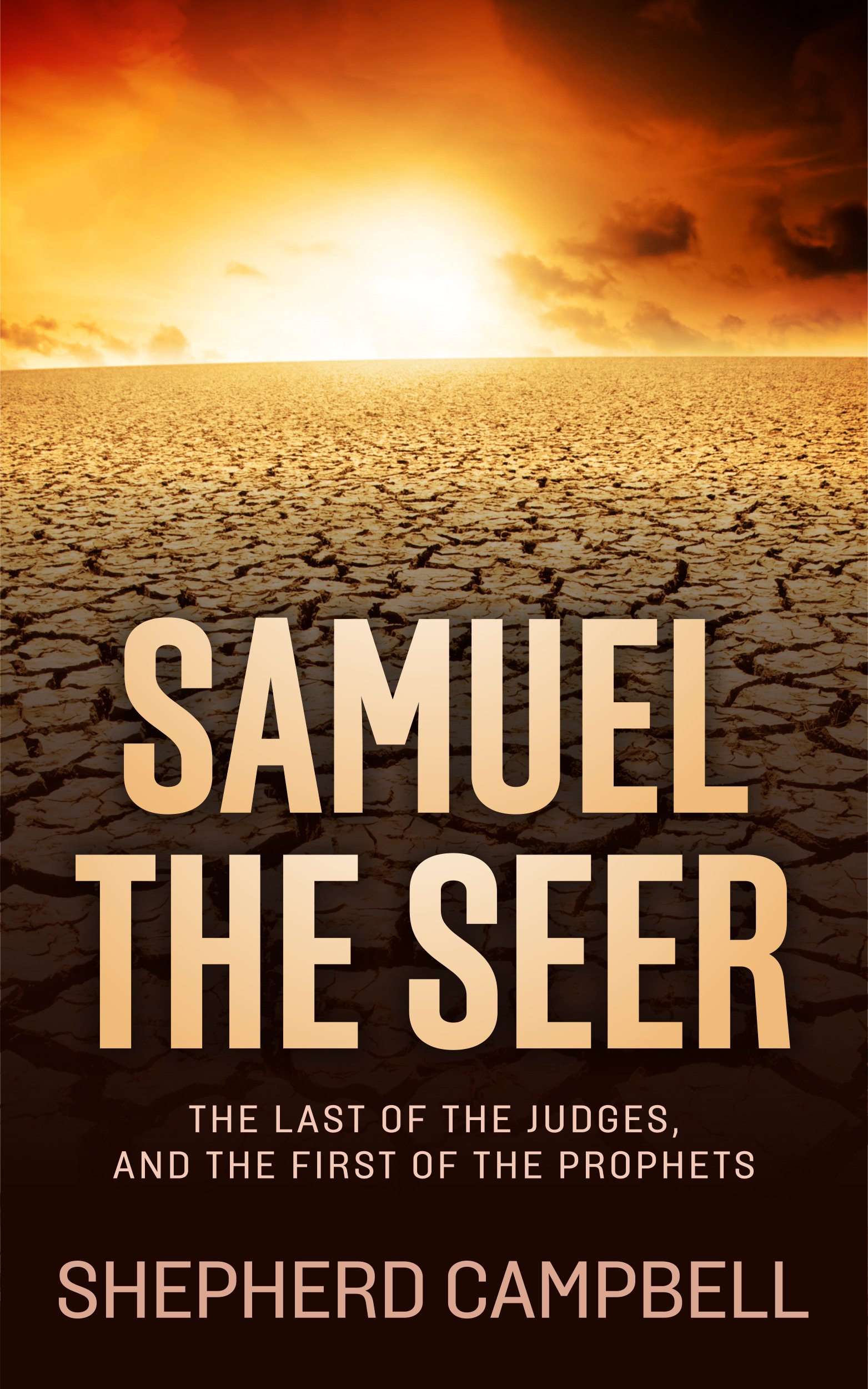VISIT OUR FACEBOOK PAGE!
The Sodomite Civilization
The Three Visitors & Sodomite Society
Abraham dwelt in the region of the Sodomite society. Mamre was approximately 20 miles to the west of the Dead Sea. Bab edh-Dhra has been listed as a possible candidate for the location of Sodom.
Bab edh-Dhra is located southeast of the Dead Sea. It is approximately 60 miles from Mamre. Though Abraham and Lot were separated, the two surely stayed in touch due to their close proximity.
After Abraham and Lot had their adventure with Chederlaomer, they returned to their respective homes. God once again appears in Genesis 18.
Abraham is in Hebron, at the grove of Mamre, sitting "in the tent door, in the heat of the day". This visit was to be a prologue to the Sodomite destruction which was at hand.
Perhaps Abraham was resting from a morning full of work, waiting out the heat in the cool of his tent door, staring out at the land spreading forth before him. Perhaps he was in deep thought about God's promise to one day give him this land to possess as his own. More than likely he was thinking about the son God would soon grant through Sarah to inherit the land. Scripture does not elaborate.
SODOMITE CIVILIZATION PAGE CONTENTS
|
Click on a link to view that section of this page.
Sodom & Gomorrah in the Mishna Sodom & Gomorrah in the Talmud |
Genesis 18:2
"And he lifted up his eyes and looked, and, lo, three men stood by him; and when he saw them, he ran to meet them from the tent door, and bowed himself toward the ground."
Mamre is located approximately 20 miles west of the Dead Sea. The Cities of the Plains (Sodom & Gomorrah) dwelt along the plains of the Dead Sea. Though the exact location of Sodom and Gomorrah remains a mystery, possible locations have been suggested as the Biblical site of this civilization.
Each of these locations rests less than 60 miles from Mamre. Bab edh-Dhra is thought by many scholars to be a solid candidate for Sodom. This was located southeast of the Dead Sea. Bab edh-Dhra was a 60 mile journey from Mamre.
Abraham would have had much interaction with these people. Lot had all but become a Sodomite, settling down in the city of Sodom. The sin of the lavish Sodomite society would not have been lost on Abraham.
The appearance of these three visitors is sudden, and Abraham acts as if he was expecting them. It becomes clear that these three men are divine figures. They are not shown to have walked up. Simply, Abraham looked up and they were there. Verse 1 makes it clear that this was a physical appearance of God in the form of a man, accompanied by two other men, later seen to be angels.
Unknown to Abraham, their mission concerned the Sodomite cities of the Dead Sea plain.
Abraham's manner is very peculiar, and suggests that he perhaps sensed these figures were in someway related to his prayers. The phrase translated as "bowed himself", is the Hebrew word Shachah. Throughout Scripture, this word is the usual word used to denote "worship".
It is interesting that this is the first time it is used in all of Scripture, and is associated with his reaction to the three strange visitors.
It is not clear if he initially knew he was in the presence of God directly. Abraham does address one of the men as "My lord", "Adonai" in Hebrew.
Though this is one of the divine names used in Scripture, it is also used as a term of respect among men. Yet he does show an extreme sense of urgency in waiting upon his guests.
"And Abraham hastened into the tent unto Sarah, and said, Make ready quickly three measures of fine meal, knead it, and make cakes upon the hearth. And Abraham ran unto the herd, and fetched a calf tender and good, and gave it unto a young man; and he hasted to dress it. And he took butter, and milk, and the calf which he had dressed, and set it before them; and he stood by them under the tree, and they did eat." (18:6-8)
Their business was with the Sodomite sin, however, God took time to visit Abraham, as this mission directly involved him. One can imagine Abraham hustling from one location to another, assuring that preparations were being made properly.
Imagine God's perspective on the scene, as Abraham ran from the tent to the herd and back. Then, once he had finished the meal, he stood and waited on them, while God and His angels ate.
Conceivably, Abraham was also anxious to learn the reason for their visit. It seems only logical that God's promise of a son through Sarah, made earlier in the later parts of chapter 17, consumed his mind and prayers. He may have seen these visitors as possible answers to the numerous prayers he had been offering up to God, and was eager to hear their words.
Immediately upon finishing their meal, verse 9 reads, "they said unto him..".
It is interesting to note that the text uses the plural "they" when telling who spoke first to Abraham. Every other time in this passage the speaker is referred to in the singular, either "he", or, "the Lord".
In any case, they ask for the whereabouts of Sarah. Though God surely knew she was in the tent, perhaps He was not ready to reveal Himself to Abraham quite yet.
SHARE YOUR THOUGHTS ON THE SODOMITES
What is your opinion of the sins of the Sodomite society? Do you believe Sodom and Gomorrah existed, or is it a myth? Click on the above link to give us your insights, comments, questions, and general thoughts!
Abraham is then informed that Sarah will have a son, at which point, Sarah, listening to the conversation from behind the door, laughs to herself at the ridiculousness of such a notion.
Verse eleven is an interesting verse because it makes mention of the couples late age, and that Sarah is past the age of being physically able to bear children.
"Now Abraham and Sarah were old and well stricken in age; and it ceased to be with Sarah after the manner of women."
In other words, it would take a divine miracle for Sarah to give birth at her current age, and she obviously did not anticipate that happening.
Sarah was completely unaware of who these visitors were, as Abraham was not too certain himself. Thus, a stranger making such a comment to her husband would have seemed ridiculous.
The stranger then asks why Sarah laughed, even though she had laughed to herself, and there was no humanly way possible this stranger could have known that. The explanation, as it certainly had registered with Abraham by this time, was this stranger, and his friends, were angels, and perhaps even God Himself. Sarah became afraid at the man's question, sensing that these were indeed divine messengers, and in an understandable panic, denies her lack of faith.
|
God gently points out that yes, she did in fact laugh. However, He overlooks her lie, for that is not why they had come. God then goes on to reiterate His promise to the both of them regarding their future son. "Is anything to hard for the Lord? At the time appointed I will return unto thee, according to the time of life, and Sarah shall have a son." | |
|
The men quickly move onto the other business at hand, as Scripture reads they rose up "and looked toward Sodom". The wickedness of Sodom and Gomorrah , and the other Sodomite cities of the plain, had reached its capacity, and the Lord and brought His angels to help with the destruction of these cities. |
SODOMITE SOCIETY
Sodom was the principal of 5 cities located around the Dead Sea. This complex of cities included Sodom and Gomorrah, Zoar, Admah, and Zeboim. The people living in these cities made up the Sodomite society. This was a wealthy society. The geographic region of the Sodomite complex was one of lush, fertile land. Natural resources, such as the much coveted Bitumen, were found in abundance throughout the area.
The Sodomite Lifestyle
The following scene depicts the depth of wickedness found in Sodom and Gomorrah.
Genesis 19:4-9
"But before they lay down, the men of the city, even the men of Sodom, compassed the house round, both old and young, all the people from every quarter: And they called unto Lot, and said unto him, Where are the men which came in to thee this night? Bring them out unto us, that we may know them. And Lot went out at the door unto them, and shut the door after him, And said, I pray you, brethren, do not act so wickedly. Behold, now, I have two daughters which have not known man; let me, I pray you, bring them out unto you, and do ye to them as is good in your eyes: only unto these men do nothing; for therefore came they unto the shadow of my roof. And they said, Stand back. And they said again, This one fellow came in to sojourn, and he will needs be a judge: now will we deal worse with thee than with them. And they pressed sore upon the man, even Lot, and came near to break the door down."
God hints to Abraham as to the extent of the Sodomite wickedness in Gen. 18:20.
"Because the cry of Sodom and Gomorrah is great, and because their sin is very grievous."
Yet, Scripture is silent as to the exact nature of the sin committed in Sodom and Gomorrah. This is the only example in Scripture of a firsthand account which details the specific Sodomite transgressions. Consequently, the nature and degree of the sinfulness in Sodomite society has been a much debated topic.
Study Resource
The History Channel presents History's Mysteries - Sodom and Gomorrah. History's Mysteries embarks to the Holy Land in pursuit of archaeological evidence of Sodom and Gomorrah. The remains of two ancient sites, Bab edh-dhra and Numeira, have produced tantalizing evidence they may be the lost cities of Sodom and Gomorrah, not to mention a nearby cave supposed to be the one Lot hid in! Click on the link below to re-direct to amazon.com and History's Mysteries - Sodom and Gomorrah!
History -- History's Mysteries Sodom and Gomorrah
SODOMITE SOCIETY IN THE MISHNAH
The Mishnah claims the Sodomite sin was related to property. According to rabbinic tradition, the Sodomites perceived what was theirs as theirs, and what was yours, is yours.
A life led by this principal tends to care less and less about his neighbor. This attitude leads one towards a lack of compassion, and an extreme sense of selfishness.
Visitors to Sodomite society were indeed treated with a lack of compassion, and oftentimes, treated outright sadistically. One tradition speaks of a bed which visitors to Sodom and Gomorrah were forced to sleep in.
If the occupant of the bed was too short, the individual was stretched to fit it. If they were too tall, then the individual was cut up in order to fit.
THE TALMUD
Rabbinic tradition tells of an incident in which the sadistic nature of Sodom and Gomorrah manifests itself in the way the townspeople treat two young girls.
According to this tradition, the story involved Lot's daughter, a young girl by the name of Paltith, and another young girl. A poor man was said to have entered the city, at which point he was given bread to eat by the two girls.
Upon hearing of their kindness towards the old man, the Sodomite authorities burned Paltith alive. They smeared the other girl's body with honey, hung her from the city wall, and left her hanging there until bees had eaten her to death.
Some traditions hold that it was the "cry" of the young girl hung from the walls which reached God.
This was the "cry" He spoke to Abraham of, and ultimately led to the destruction of Sodomite society. Behavior like this would most certainly qualify as grievous.
|
Eliezar Another incident involves Eliezar, Abraham's servant, and depicts the pervasive corruption found within the cities of the plain. Eliezar is said to have gone to visit Lot in Sodom. Upon entering the city, Eliezar got into a dispute with a Sodomite over a beggar. |
|
The Sodomite hit Eliezar in the head with a stone, which caused Eliezar to bleed. The Sodomite then charged Eliezar for the service of bloodletting. The judge sided with the Sodomite, forcing Eliezar to pay. Eliezar is said to have then picked up a stone, struck the judge on the forehead, and asked the judge to pay the Sodomite.
SEXUAL NATURE OF SODOMITE SIN
Throughout history, Sodom and Gomorrah have been used as metaphors for rape, homosexuality, sexual immorality, and sexual deviance. The English word, "Sodomy", is derived from "Sodom", and means non-vaginal intercourse, as well as bestiality.
The Catholic Church pounced on this passage, as well as other New Testament passages, to support the Church's claim that acts of homosexuality are to be considered "acts of grave depravity".
Proponents of this theory point to the apparent demand by the men of Sodom for Lot's strangers to come out of the house, so they can forcibly have homosexual intercourse with them.
In other words, the Sodomite men want to rape the angels in Lot's house. However, there are scholars who claim that this passage is not referring to rape, or any acts of sexual immorality at all. The sin of Sodom, according to these people, is their inhospitable attitude towards strangers.
The crux of this division rests in the interpretation of the word, "Know".
"Bring them out unto us, that we may know them. -- Genesis 19:5
The Hebrew word for "Know" appears over 900 times in the Bible. Proponents of a non-sexual view hold that, of the 900 appearances, only 1 percent of the time is it used with sexual connotations. They argue that in this passage, the men of Sodom wanted to interrogate the men in Lot's house, not rape them.
However, one of those few sexual connotations occurs three verses later, when Lot offers up his two daughters to the Sodomite men, in exchange for the safety of the two angels.
"Behold now, I have two daughters who have not known man..."
Proponents of a sexual-nature of sin, point to the context which "Know" is used within the passage as evidence of sexual immorality.
If this passage remains vague still, there is a passage in the book of Jude which specifically names the sins of the Sodomite society.
Jude 1:7
"Even as Sodom and Gomorrah, and the cities about them in like manner, giving themselves over to fornication and going after strange flesh, are set forth for an example..."
This would seem to fit the nature of the passage in Genesis. The men sought after "strange flesh", as the visitors in Lot's house were indeed strangers.
The context of the passage would also seem to suggest that the Sodomites sought to fornicate with Lot's guests. Though this passage does not outright state the damning sin of Sodomite society, it would seem to suggest, according to many scholars, homosexual rape.
The book of Enoch condemns "sodomitic sex". Scholars argue this passage in Enoch is another example of a specific sexual condemnation. These passages taken together appear to suggest Sodom and Gomorrah's damning sin was primarily that of a sexual nature.
However, sexual immorality was only one of many vices which gripped Sodomite society.
BIBLICAL REFERENCES
There are close to twenty references throughout Scripture, outside of Genesis, to Sodom and Gomorrah. God used the fate of these cities to demonstrate the consequences of wickedness. The Sodomite society and lifestyle stands in stark contrast to the lifestyle propagated by Abraham and Lot. These references shed some light on the nature of Sodom and Gomorrah's sin.
Isaiah had this to say about the Sodomite sin.
"..they parade their sin like Sodom..." (Is. 3:9)
Apparently, the inhabitants Sodomite society had no fear of God. They did not revere His commands, nor walk in His statutes. They were caught up in their own riches and wealth, and became proud and arrogant. They sinned openly, flaunting their sin before God and man. They had lost all sense of accountability.
Jeremiah compared the sins of Jerusalem in his day, to those of Sodom and Gomorrah in Jeremiah 23:14.
"And among the prophets of Jerusalem I have seen something horrible: They commit adultery and live a lie. They strengthen the hands of evildoers, so that no one turns from his wickedness. They are all like Sodom to me; the people of Jerusalem are like Gomorrah."
Jeremiah accused Jerusalem of adultery, lying, continual and willful sin, and ultimately, pride before God. All of these he likens to the sin of the Sodomites. Throughout the New Testament, Jesus Christ condemns specific towns which reject His disciples to the fate of Sodom and Gomorrah.
Matthew 10:14 "If anyone will not welcome you or listen to your words, shake the dust off your feet when you leave that home or town. I tell you the truth, it will be more bearable for Sodom and Gomorrah on the day of judgment than for that town."
Matthew 11:23 "And you, Capernaum, will you be lifted up to the skies? No, you will go down to the depths. If the miracles that were performed in you had been performed in Sodom, it would have remained to this day. But I tell you that it will be more bearable for Sodom on the day of judgment than for you."
These passages from Jesus would seem to indicate that hospitality was seen as a quality of righteousness in the ancient world.
Any city that proved inhospitable, was condemned to the fate of Sodom and Gomorrah. The Sodomite cities of the plain indeed treated visitors with cruelty, brutality, and viciousness.
Ezekiel 16:49-50 is a unique passage in that God Himself talks of the sin of Sodom and Gomorrah.
"Now this was the sin of your sister Sodom: She and her daughters were arrogant, overfed and unconcerned; they did not help the poor and needy. They were haughty and did detestable things before me. Therefore I did away with them as you have seen."
This passage confirms the above allegations concerning Sodomite society. The cities of the plain were "overfed", indicating a wealth and abundance of food and resources.
They were "unconcerned", as Isaiah and Jeremiah both pointed to their arrogance, and "haughty and did detestable things", demonstrated in their treatment of the young girls and their treatment of God's angels.
They also refused to help the needy and the poor, an indication of the selfishness of the people.
If it would not have been for the intercession of the angels, Lot would have been counted amongst the Sodomite victims.
God tells Abraham
Abraham is unaware of what is about to happen to the Sodomite society. Yet, the Lord has a conversation with Himself in verses 17-19 about whether to tell what His plans are.
In verse 19 God says:
"For I know him...", concerning Abraham, and how He is sure Abraham will bring his household up in the "way of the Lord"
The word translated as "know" indicates a deep friendship. It expresses an idea of intimate friendship between God and Abraham, as if their relationship was not just Creator to created, but Friend to friend. God felt it necessary to share with Abraham what He was about to do to the Sodomite cities of the plain.
God then relates His impending plan of destruction for the cities of the plain, and gives the reason why. He does not look for, nor seek, approval. He wants Abraham to understand why, and understand that wickedness leads ultimately to death.
The destruction of the great cities of the plain would stand as a testament to the God of Abraham, and the punishment for wickedness, corruption, and immorality.
The situation parallels the earlier incident with the Tower of Babel . God was said to have "come down" and evaluated the situation before he destroyed it, to see firsthand how bad things had become.
Verses 20 and 21 read;
"And the Lord said, Because the cry of Sodom and Gomorrah is great and because their sin is very grievous, I will go down now, and see whether they have done altogether according to the cry of it, which is come unto me; and if not, I will know it."
After making this statement, the Lord and His two angels turned their "faces from thence, and went toward Sodom". Sodomite society was rapidly approaching its end.
They had business to attend, yet, Abraham is said to have stood his ground before the Lord. Instead of turning and heading back to his tent, Abraham, perhaps moved by the thought of Lot and his other family in the region, felt the need to intercede with God on their behalf.
Genesis 18:23-33 records an astonishing conversation between God and Abraham. As God is on His way to destroy Sodom, Abraham pleas for mercy on Sodom, and the other cities of the plain, with God. He starts at the number of fifty righteous souls.
If, he pleas, God finds fifty righteous Sodomite people, won't He spare the rest for their sake?
God answers in the affirmative, at which point Abraham shows his skills of negotiation, and asks what if there are not fifty, but forty.
Would God spare the cities for forty righteous souls?
And so the conversation goes, finally resting upon the number of ten righteous souls. It is no coincidence that the number ten is also the number of people in Lot's family.
Abraham, in essence, had just saved the life of his nephew, for the second time, by pleading with God for mercy. Despite the prevailing wickedness and corruption of the Sodomite civilization, Abraham pleas for their lives as well.
The discourse closes with the Lord going His way, towards Sodom, and Abraham returning to his tent, undoubtedly worried about Lot. Scripture goes on to describe the destruction of Sodom, and the other cities of the plain, and of the rescue of Lot and his daughters. Abraham was well aware of what had happened, and continued to thrive in the land of Canaan. Lot's fate was much different, however. He had bargained with the angles to let him flee to Zoar with his family. On their way out of Sodom Lot's wife chose to look back.
She became a pillar of salt. Lot, though, made it safely to Zoar with his daughters. Scripture relates that Lot became afraid in Zoar. It is not stated what he became afraid of.
Perhaps Lot was afraid of collateral damage Zoar might suffer. Perhaps Lot was afraid of the residents in Zoar. Whatever the reason, Lot was scared enough to gather his daughters and flee to the mountains.
Ironically, it was the mountains God's messengers told Lot to flee to originally. However, he felt he knew best, and bargained for Zoar. Now, however, he flees to the mountains. Perhaps God has our best interests in mind, even when we don't agree.
Scripture tells Lot lived in a cave with his daughters. They became worried about the ability to have a son with no other males around. They conspired, got Lot drunk with wine, and slept with him (Genesis 19:30-38).
Amazingly, they did this not once, but twice! Each daughter had sex with Lot, their father. Each encounter led to a male child. Lot's first-born daughter bore him a son named Moab. It was from Moab's line the Moabites would emerge from, and rule over Moab.
The second daughter also produced a male child. This child's name was Ben-ammi. Ben-ammi became the "father of the sons of Ammon to this day."
Moab and Ammon would battle with Israel throughout her early development. It was King Eglon of Moab who ruled Jericho and the surrounding area for 18 years. God finally ended his rule through the exploits of Ehud, the Benjamite.
|
Lot fared much worse than his uncle Abraham. Abraham and Lot experienced a lot together over the course of their lives. Lot, though, did not possess the faith his uncle had. Indeed, few men have ever possessed the faith of Abraham. Three great nations of antiquity arose from the lines of Abraham and Lot. |
|
One, however, remains to this day. It was Abraham, not Lot, who was to carry the promised "seed of the woman" into the land of Canaan.
Back to The Sodomite Sin
Back to Abraham
Back to Home Page
Recent Articles
-
The Tabernacle
Feb 27, 25 04:47 PM
The Tabernacle was where Yahweh met with his people before the First Temple was built. It was also called the Tent of Meeting. -
The Tabernacle of Moses
Feb 19, 25 09:50 AM
The tabernacle of Moses was built by Moses, per instruction from God, during the Exodus out of Egypt. It represented God's presence amongst His people. -
The Ark of the Covenant
Feb 19, 25 09:46 AM
The Ark of the Covenant is one of the most mystifying objects in all of human history. It's power was so great that Israel often carried it to the front lines. -
King David of Israel
Feb 19, 25 12:51 AM
The story of King David of Israel is a rags-to-riches tale of the family runt rising to national King. King David would become Israel's greatest king. -
The Nephilim
Feb 15, 25 10:35 PM
Were the Nephilim byproducts of fallen angels and women? Enoch wrote it was so, as did Moses. What mysteries lie buried in the pages of the Old Testament? -
In the Days of Noah
Feb 15, 25 10:32 PM
Jesus stated that in the last days it will be as in the days of Noah. The days of Noah were some of the strangest the world has ever seen. -
Jerusalem
Feb 11, 25 06:13 PM
A thorough dive into the city of Jerusalem and its rich, vibrant and ancient history.
The Mystery of Sodom and Gomorrah
Where do you think the mysterious cities of Sodom and Gomorrah are located? Or do you believe the stories are purely myth and fiction? Share your thoughts and comments on Sodom and Gomorrah!
SAMUEL the SEER
Now Available in Print & eBook on Amazon!!
POPULAR TOPICS
Learn more about these popular topics below. The Bible is full of fascinating stories, characters and mysteries!
BIBLE MAPS
Explore the land of the Old Testament! View these maps of the Bible.
